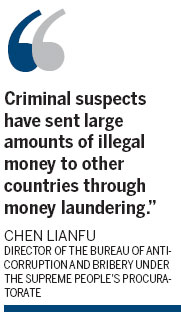Closer co-op urged to stop trans-border corruption
Updated: 2011-07-14 07:33
By Zhang Yan (China Daily)
|
|||||||||||
SHANGHAI - A senior Chinese prosecutor is calling for closer international cooperation in the fight to sever the arteries that sustain the "global cancer" of trans-border corruption.
Chen Lianfu, director of the bureau of anti-corruption and bribery under the Supreme People's Procuratorate, said agencies and nations must work together to stem the flow of assets and cash being transferred by corrupt officials.
"Criminal suspects have sent large amounts of illegal money to other countries through money laundering," Chen said in an exclusive interview with China Daily.

"Such things cause serious economic damage to the victim country and jeopardize international financial order."
Trans-border corruption, he said, not only affects single nations or enterprises, but economic development, social stability and national security on a global scale.
"The fight against corruption is not simply an internal matter for one nation but an issue that requires attention and active responses from all nations and their anti-corruption agencies," Chen said.
He called for tighter trans-border cooperation to counter money laundering in accordance with bilateral and multilateral conventions and treaties.
"By doing so, we will be able to cut the channels taken by illegal proceeds at the root and leave criminals with nowhere to flee and hide," Chen said.
The senior prosecutor said a large number of corrupt Chinese officials from the construction and finance sectors are still at large and spending their ill-gotten gains in foreign countries.
"Most of them flee to the United States, Canada, Australia and Southeast Asia countries and the illegal funds they transfer overseas are in the hundreds of millions of yuan," he said.
Chen did not disclose exactly how many such corrupt officials are now living overseas but said more than 90 percent of them were accused of corruption, bribery and embezzlement and transferred their hauls mainly through money laundering, illegal investment and underground financial institutions.
Chen said it is never easy to get people before the courts after they have fled.
"In many cases, we face difficulties in getting fugitives back to China to face a trial," Chen acknowledged.
China has signed extradition treaties with 37 countries, and inked 106 legal assistance agreements with 68 countries and regions.
But the country has not yet signed bilateral extradition treaties with some Western nations, including Canada and the US, Chen said.
Moreover, many countries are at different stages on the road to taking part in the United Nations Convention against Corruption and the UN Convention against Transnational Organized Crime.
"In particular, in some individual cases, we have been making efforts to request legal assistance from some countries, considering the background of the case, the people suspected of the crimes, the political or economic impact and we haven't achieved any progress in getting these fugitives back," Chen said.
Chen proposed that all countries in the world put aside political, economic and legal differences and team up against trans-border corruption.
He said nations should set up swift, efficient and well-coordinated information and data exchanges and enhance their capacities to collect information and data on corruption.
Xinhua contributed to this story.